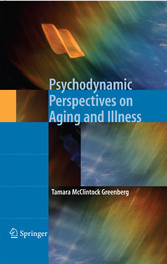Suchen und Finden
Preface
5
Contents
9
Chapter 1 When the Body Intrudes: Psychotherapy with Older and Medically Ill Adults
11
Psychoanalytic Theory and the Body
13
Applying Psychodynamic Concepts to Aging and Medically Ill Patients
16
Aging and the Medically Ill: An Increasing Population
24
Conclusion
26
References
27
Chapter 2 Technology, Idealization, and Unconscious Dynamics in the Culture of Medicine
29
The Hypomanic Culture of Medicine
31
Patient Expectations in Medicine
34
Technology and Idealization
36
Looking for Love (and a Cure): Medical Relationships
40
Conclusion
43
References
44
Chapter 3 The Trauma of Medical Illness
46
The Mental Health Clinician and Medical Patients
47
Medical Illness as Adult-Onset Trauma
54
Past Trauma in the Context of Aging and Illness
61
Conclusion
64
References
65
Chapter 4 Narcissistic Aspects of Aging and Illness
67
The Concept of NarcissismWithin Psychodynamic Theory
68
The “Midlife Crisis”
76
Conclusion
80
References
81
Chapter 5 Transference and Countertransference in Aging and Illness
83
Transference and Implications for Older and Medically Ill Patients
84
Countertransference Feelings inWorking with Medical Patients
94
Conclusion
100
References
100
Chapter 6 Self-Destructive Behaviors, Masochistic Dynamics, and Illness
102
Psychodynamic Ideas on Masochism
103
Masochism and the Body
105
Conclusion
112
References
113
Chapter 7 Cognitive Changes and Implications for the Therapeutic Encounter
114
Cognitive Impairment in the Elderly
115
Normal Physical Changes Related to Aging
116
Psychotherapy with Cognitively Impaired Adults
120
Conclusion
124
References
124
Chapter 8 WhatWe Know and WhatWe Don’t: The Influence of Psychological Factors on Medical Illness
127
Heart Disease
129
Osteoporosis
132
Cancer
132
Child Abuse
133
The Meaning of the Research on Psychological Factors and Medical Risk
134
Conclusion
136
References
137
Chapter 9 Hope and Grief: The Introduction of an Emotional Language
140
Alexithymia: Adaptive Aspects of Psychic Detachment
140
Alexithymia and Hysteria
143
Trauma, the Sense of Self, and Therapeutic Action
145
Hope and Grief: Advanced Understandings of Therapeutic Action
147
Epilogue) Resilience in the Elderly and Medically Ill
149
References
150
Index
152
Alle Preise verstehen sich inklusive der gesetzlichen MwSt.









